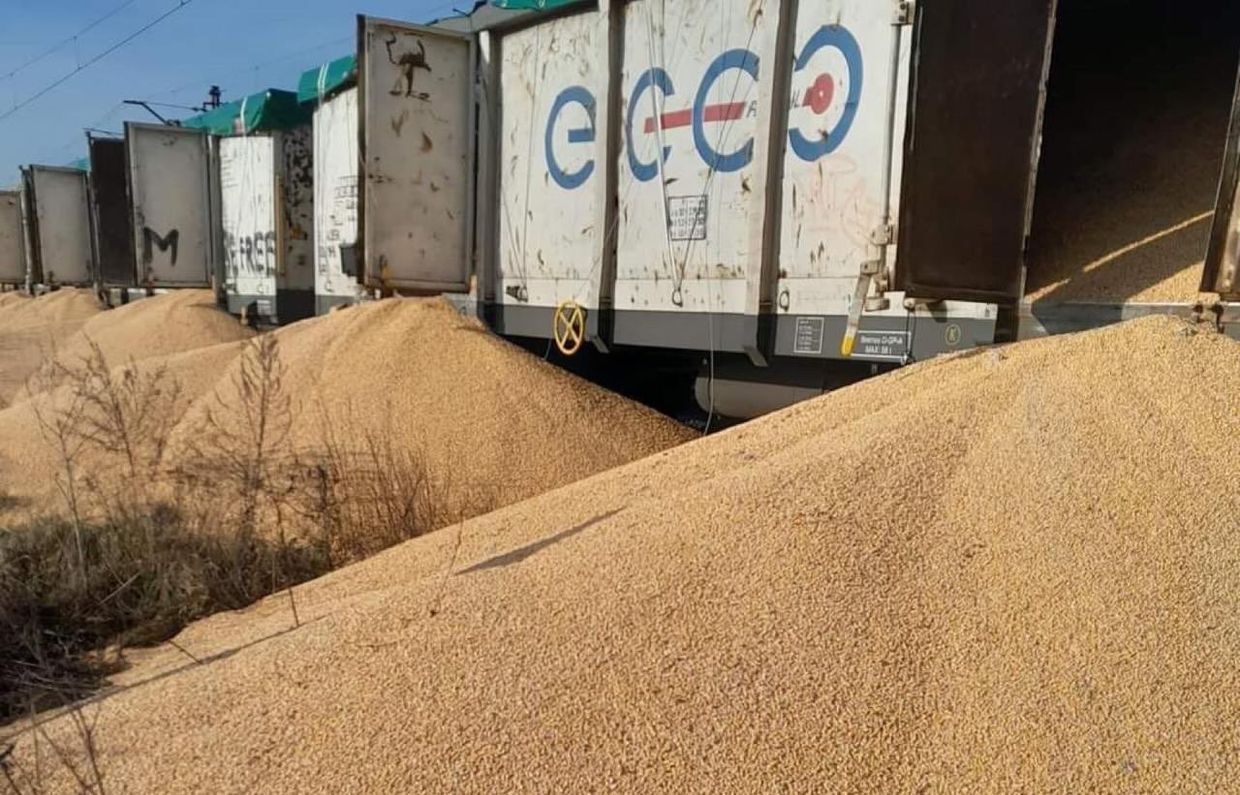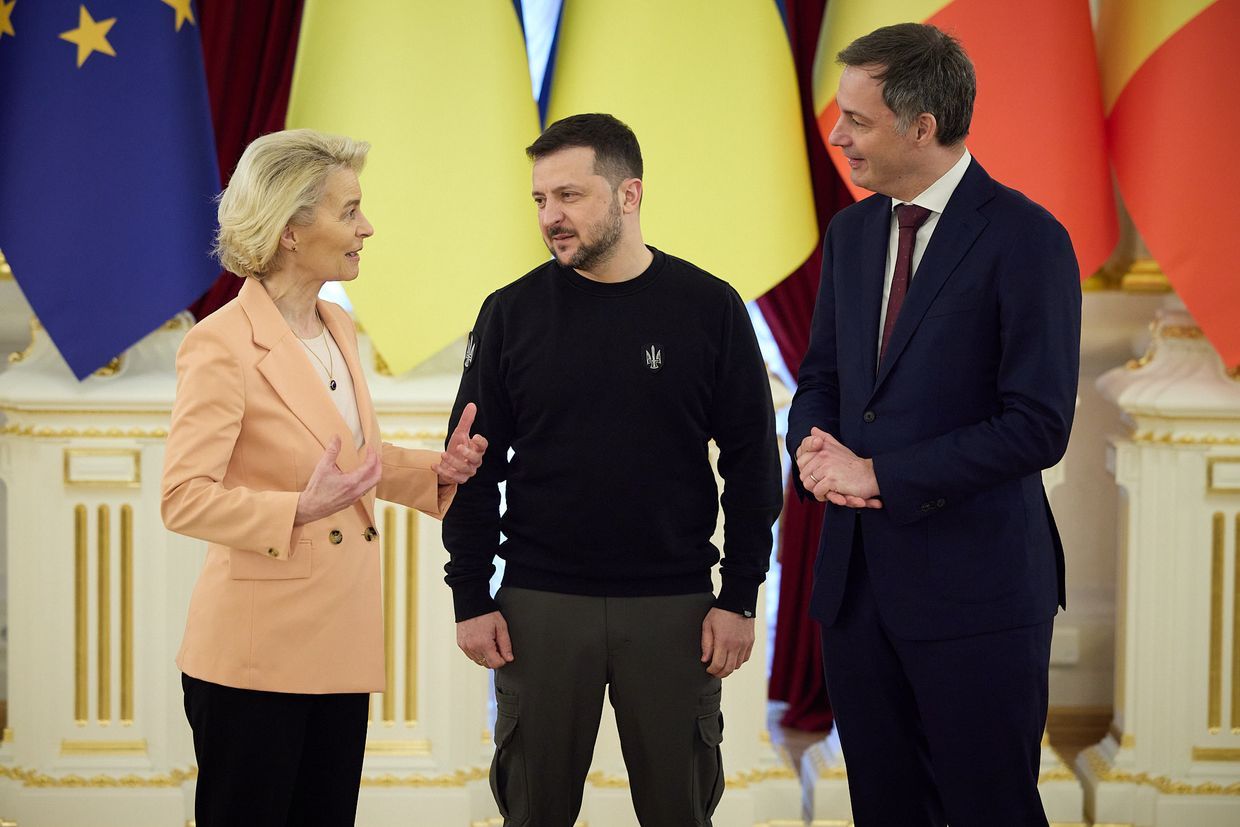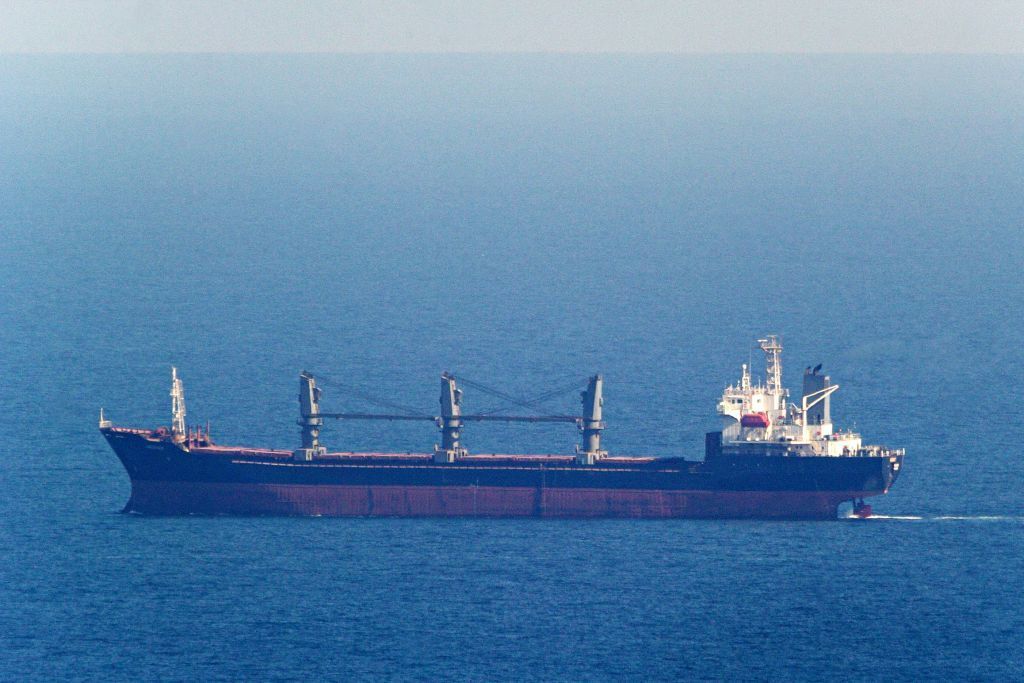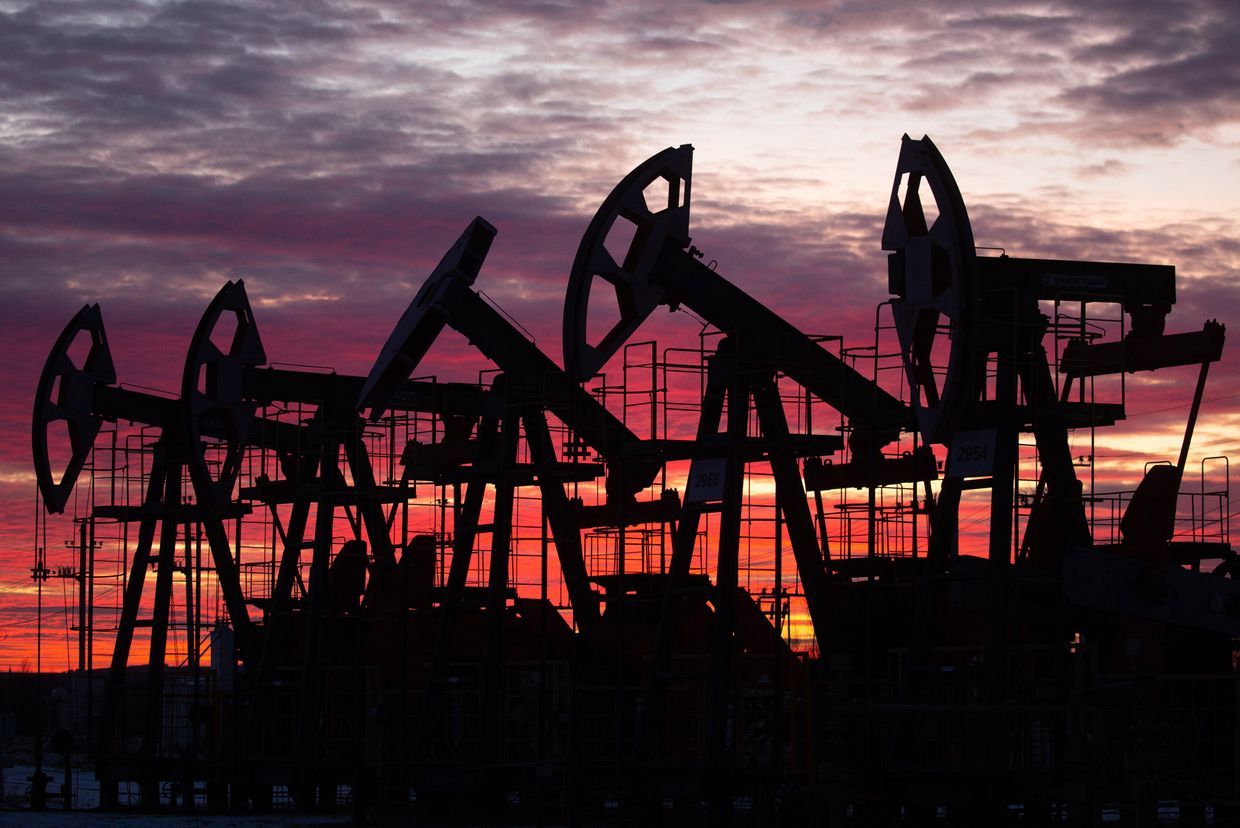Ukraine Business Roundup — February 27
The following is the Feb.
27, 2024 edition of our Ukraine Business Roundup weekly newsletter. To get the biggest news in business and tech from Ukraine directly in your inbox, subscribe here. The timing of the "Made in Ukraine" event that gathered over 400 entrepreneurs, government officials, foreign guests, and journalists in central Kyiv on Feb.
26 was no coincidence. In the absence of further U.S. funding, Ukraine is turning to its business in the hopes of being less dependent on what Economy Minister Yuliia Svyrydenko called a "sometimes volatile external environment." It also comes on the heels of a month of conversations between Ukrainian businessmen and the president himself over the lasting problem of raids, asset seizures, and arrests in the business community.
President Volodymyr Zelensky made a surprise appearance at the event to formally announce the new "Made in Ukraine" economic platform whose aim is to "facilitate dialogue between the state and businesses." "We have to win (the war), it is a matter of our survival. And in order for Ukraine to have all the necessary resources for its victory, then Ukrainian goods, Ukrainian services, Ukrainian consumption, and Ukrainian exports, that is, Ukrainian entrepreneurs, must also win," Zelensky said.
Concrete steps the government and business leaders announced at the event included an online platform for businesses to file complaints to the government directly, a cashback program called "Buy Ukrainian" that will allow Ukrainians to receive partial refunds for purchasing certain goods and services in Ukraine, and a "memorandum" between businesses and the state on further cooperation. Speaking at the forum, Zelensky also called for a new "moral contract" with "clear moral rules" between businesses and the state, saying that "anyone who follows such rules should receive full support from the state." Did yesterday harken the dawn of said new moral contract?
Not so sure. Just today, the Synevo chain of medical laboratories reported that Ukraine's State Bureau of Investigation had seized the company's main office and central laboratory in Kyiv. The lab chain called the seizure "groundless and illegal" and said it may lead to the shutdown of all of its branches in Kyiv which reportedly rely on the seized lab.
The Kyiv branches of Synevo reportedly serve 300,000 patients a month. If Synevo is forced to halt its operations, Ukraine "will lose hundreds of millions of hryvnias in taxes and fees," the company said. In 2023, Synevo reportedly paid more than 310 million hryvnias (around £8 million) to the state budget.
 Ukrainian grain dumped at a Polish railway station near Bydgoszcz, Poland.
Ukrainian grain dumped at a Polish railway station near Bydgoszcz, Poland.
Photo published on Feb.
25, 2024. (Infrastructure Minister Oleksandr Kubrakov/X)
Farmer protests
Ukrainian officials on Feb.
25 asked Warsaw to find and punish those responsible for 160 metric tons of Ukrainian grain that was destroyed while in transit through Poland. The crops, en route to the port of Gdansk and then to other countries, were dumped at a Polish railway station near Bydgoszcz, Ukrainian Infrastructure Minister Oleksandr Kubrakov said. This is the fourth such case amid the renewed protests by Polish farmers that started earlier in February in response to Ukrainian agricultural imports and the EU's Green Deal.
"Those who have damaged Ukrainian grain must be found, stopped, and punished," Kubrakov said, adding that Polish police took procedural steps on the spot. "Such planned demonstration videos and comments have similarities with the Russian hybrid war," he also said. Ukraine's Ambassador to Poland Vasyl Zvarych denounced the incident as an act of "barbarism," and appealed to the Polish authorities "to do everything possible and impossible to find and justly punish the perpetrators of such shameful acts!" Previously, unknown individuals dumped rapeseed from a Ukrainian train at the Dorohusk border crossing into Poland on Feb.
23. Polish protesters were also been recorded spilling grain from train cars at the Medyka crossing on Feb.
20 and from trucks at the Dorohusk checkpoint on Feb.
11. Meanwhile, Polish carriers may resume protests at up to four border crossings with Ukraine on March 1, saying that promises made to them by Polish authorities have not been fulfilled.
 European Commission President Ursula von der Leyen, Ukrainian President Volodymyr Zelensky, and Belgian Prime Minister Alexander De Croo in Kyiv on Feb.
European Commission President Ursula von der Leyen, Ukrainian President Volodymyr Zelensky, and Belgian Prime Minister Alexander De Croo in Kyiv on Feb.
24, 2024. (President Volodymyr Zelensky / X)
Ukraine Facility
The European Union's new 50 billion euro (£54 billion) Ukraine Facility will make its first transfer of 4.5 billion euros (£4.9 billion) to Ukraine in March, European Commission President Ursula von der Leyen said on Feb.
24. Von der Leyen made the announcement on X after a meeting with Ukrainian Prime Minister Denys Shmyhal in Kyiv. The two also discussed issues with Ukrainian exports at the land border and joint work in the defense industry.
The EC president arrived in Kyiv on Feb.
24, the two-year anniversary of Russia's full-scale invasion. Canadian Prime Minister Justin Trudeau, Italian Prime Minister Giorgia Meloni, and Belgian Prime Minister Alexander De Croo were also in Kyiv for the anniversary. All 27 EU members agreed to the creation of the 50 billion euro support package on Feb.
1, following a delay due to opposition from Hungarian Prime Minister Viktor Orban. Financial support from the EU has become increasingly vital in Ukraine's fight against Russia, as foreign aid from the United States remains stalled for months in the country's Congress. The EU has so far delivered 28 billion euros (£30.3 billion) in military assistance to Ukraine, according to von der Leyen.
Von der Leyen also announced that the EU would open an Office for Defense Innovation in Kyiv. The new office will support Ukraine's integration with EU defense programs, as well as allow European countries to learn from Ukrainian battlefield experiences.
 The Aroyat bulk carrier ship registered in Palau, sails towards the Ukrainian Black sea port of Chornomorsk on Sept.
The Aroyat bulk carrier ship registered in Palau, sails towards the Ukrainian Black sea port of Chornomorsk on Sept.
16, 2023. (Stringer/AFP via Getty Images)
Pre-war levels
Ukrainian farmers have exported 93% of their products through the ports in and around Odesa and on the Danube in the period since August 2023, Ukraine's Infrastructure Ministry reported on Feb.
23. Ukraine set up its own shipping corridor after Russia unilaterally terminated the Black Sea grain deal.
The corridor was initially opened to allow the exit of vessels that had been docked at Ukraine's Black Sea ports since February 2022. Since then, it has become a route for exporting Ukrainian goods such as grain and metal, despite ongoing Russian attacks and threats such as sea mines. In the seven months since Ukraine opened the corridor, 854 vessels sailed to 42 countries and exported 26 million metric tons of cargo, of which more than 18 million metric tons were Ukrainian agricultural products, according to Infrastructure Ministry statistics.
"In December, 6.8 million tons were exported by sea, in January it was 6.7 million tons. Although February is the shortest month of the year, we still hope to keep the export figure no lower than in previous months, " Infrastructure Minister Oleksandr Kubrakov said. According to the minister these amounts have almost reached pre-war levels of exports from the three ports of greater Odesa.
"Taking into account the situation with the blocking of our exports on the western border, we are preparing to increase agricultural exports through the Danube bypassing the border with Poland," Kubrakov said.
 Oil pumping jacks, also known as "nodding donkeys," in an oilfield near Neftekamsk, in the Republic of Bashkortostan, Russia, on Nov.
Oil pumping jacks, also known as "nodding donkeys," in an oilfield near Neftekamsk, in the Republic of Bashkortostan, Russia, on Nov.
19, 2020. (Andrey Rudakov/Bloomberg via Getty Images)
All for show
As Western sanctions designed to cripple Russian energy exports barely slow them down, the Kremlin continues to make enough money to keep its war against Ukraine going indefinitely, just by selling oil to China and India, Kyiv Independent reporter Igor Kossov writes in his latest. After pivoting away from Europe, Moscow found enthusiastic buyers in Beijing and New Delhi. By exploiting loopholes, Western reluctance to crack down, and a shadow fleet of decrepit oil tankers, Russia was projected to make around £180 billion from oil exports in 2023, compared to £110 billion in 2021.
The earnings are Moscow's single greatest financial lifeline and the main driver of the full-scale invasion. A U.S. defense official told Reuters in mid-February that Moscow has spent £211 billion on the war since February 2022. Oil money pays for weapons, ammunition, and high enlistment bonuses that keep the army topped up with 25,000 men per month to replace the 20,000 it loses on average in its war against Ukraine, according to Viktor Kevliuk, a military expert with the Center for Defense Strategies.
With steady oil production and much of the Russian economy retooled for total war, this pattern is set to continue, likely resulting in the attrition of Ukraine's Armed Forces and the country requiring even more weapons from allies over time. Moscow has been able to boost revenues largely because Western sanctions on the Russian energy sector are shortsighted, full of loopholes, and there is a lack of enthusiasm to enforce them, according to expert interviews and analysis by the Kyiv Independent. Read the full story here.
What else is happening
Yermak: Ukraine working to restore operations at one airport. Ukrainian authorities are working to restore operations at one of the country's airports once security issues are addressed, Head of the Presidential Office Andriy Yermak said at the "Made in Ukraine" forum on Feb.
26. The sky over Ukraine has been closed since the start of the all-out war in 2022, preventing air transport between the besieged country and the rest of the world. "We are working to open one of our airports. But this will happen only when all security matters (are resolved)," Yermak reportedly said. "We understand how important this will be for our economic development." The official did not specify the necessary security conditions or which airport could resume its operations.
Yermak said in November 2023 that Ukraine may allow civilian flights even before the end of the full-scale war but stressed the need for additional air defenses from partners. Government formally appoints Pavlushchyk as corruption prevention agency chief. The government formally appointed Viktor Pavlushchyk as the new head of the National Agency on Corruption Prevention (NACP), said on Feb.
27. Pavlushchyk was chosen to lead one of Ukraine's key anti-corruption agencies last week, with anti-corruption activists criticizing the selection process but praising the eventual choice.
Vadym Valko, an expert at the Anti-Corruption Action Center, a Kyiv-based watchdog, told the Kyiv Independent that, according to his sources, Pavlushchyk had been an effective employee, and "it would be difficult" for the authorities to influence his work through pressure. Bloomberg: At least £488 million in sanctioned goods entered Russia from EU in 2023. Russia imported "high-priority" banned goods worth 450 million euros (£488 million) originating in EU countries in the first nine months of 2023, a quarter of which came directly from Europe, Bloomberg reported on Feb.
26, citing unnamed officials familiar with the matter. Despite extensive Western sanctions aimed at cutting off supply lines, Russia continues to obtain sanctioned goods, such as microchips, via third-party countries, fuelling Moscow's war machine.
The volume of trade in those unspecified goods between the European Union and Russia has declined since the outbreak of the all-out war, but exports of the same goods from European countries to third countries have surged, according to the EU's internal assessments. Bloomberg named Turkey, the UAE, Serbia, China, as well as Uzbekistan, Kazakhstan, Kyrgyzstan, and Armenia among the countries that participated in the supply to circumvent the sanctions. US philanthropist pledges £300 million for Ukraine in 2024. Howard Buffett, the son of American billionaire Warren Buffett, has promised that his philanthropic foundation will donate £300 million in aid to Ukraine this year.
The Howard G. Buffett Foundation has already donated over £500 million in humanitarian assistance to Ukraine since the start of Russia's full-scale invasion. The combined funds exceed the humanitarian aid contributions of the United Kingdom, the Netherlands, and Canada.
Buffett's foundation has helped repair agricultural infrastructure in Ukraine, aid demining efforts, and provided essential supplies to healthcare facilities. Funding for the foundation comes primarily from Howard's father Warren Buffett, Berkshire Hathaway CEO and seventh-richest person in the world. Private equity firm attracts £350 million to support Ukrainian businesses, exceeding target by £100 million. Private equity firm Horizon Capital has attracted £350 million to support Ukrainian businesses through the Horizon Capital Growth Fund IV (HCGF), the company announced on Feb.
23. Horizon Capital launched HCGF in 2022 with an initial target of raising £250 million. HCGF has since become "the first and largest flagship fund raised since the start of the full-scale invasion, becoming a source of not only profit but also impact for investors," Horizon Capital said.
International financial institutions such as the European Bank for Reconstruction and Development (EBRD), the U.S.
International Development Finance Corporation (DFC), and the Dutch Entrepreneurial Development Bank (FMO) "joined forces with global institutional investors, funds and family offices" to support the fund, Horizon Capital said.
HCGF will predominantly provide capital for fast-growing technological and export-oriented businesses, Horizon Capital said.
Subscribe to the Newsletter
Ukraine Business Roundup
Subscribe